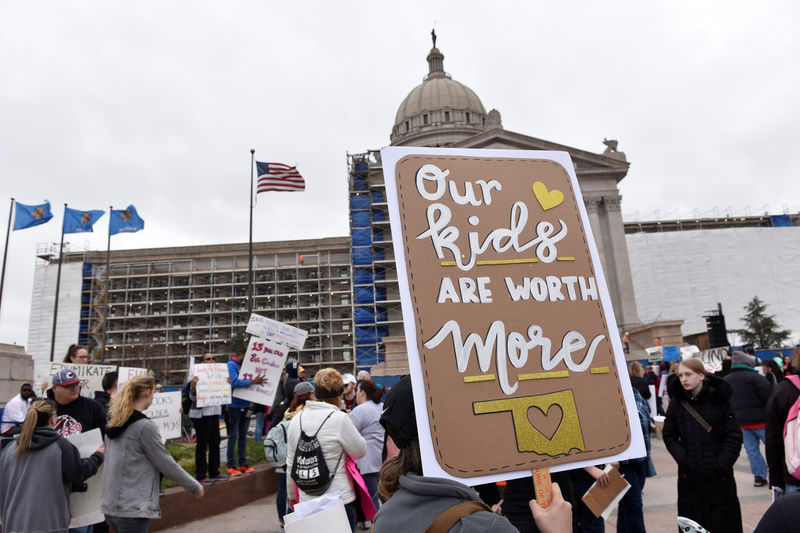 © Reuters. Teachers rally outside the state Capitol for the second day of a teacher walkout to demand higher pay and more funding for education in Oklahoma City
© Reuters. Teachers rally outside the state Capitol for the second day of a teacher walkout to demand higher pay and more funding for education in Oklahoma CityBy Lenzy Krehbiel-Burton
OKLAHOMA CITY (Reuters) – Thousands of Oklahoma teachers packed the state Capitol on Thursday to lobby lawmakers in the cash-strapped state for quick approval of a revenue package they say could end a walkout that has closed public schools for most of the week.
Chanting: “One day longer, one day stronger,” the teachers rallied outside the Republican-controlled Senate, where debate is set to start on Friday on the package that includes higher hotel taxes and increasing revenue from casinos.
The Oklahoma House of Representatives approved a $20 million internet sales tax on Wednesday as part of a revenue package aimed at ending a statewide walkout by the state’s teachers, who rank among the lowest paid in the country. They are seeking higher wages and more education funding.
The walkout, now in its fourth day, is the latest upheaval by teachers in a Republican-dominated state after a successful West Virginia strike last month ended with a pay raise. Scores of school districts in Oklahoma will remain shuttered on Friday, including the two largest.
“Our goal is to fully deliver on a teacher pay raise,” Republican Oklahoma Senate Majority Leader Greg Treat told reporters.
“We did that last week and we’re going to come through this week and replace the revenue that we had to take out to pass the package,” he said.
Last week, lawmakers approved the state’s first major tax increase in a quarter century, a $450 million revenue package that would have raised teacher pay by an average of about $6,000.
That was not enough for the teachers, seeking $10,000 over three years. Even with the pay raise approved by lawmakers, they would still receive lower mean salaries than teachers in every neighboring state, U.S. Bureau of Labor Statistics data showed.
A major cause for the budget strain comes from tax breaks the state has granted to its energy industry, which were worth $470 million in fiscal year 2015 alone.
Oklahoma has some of the lowest taxes on oil and gas production in the United States.
In contrast to other energy states that see tax windfalls during boom years, Oklahoma was not able fill state coffers even when times were good. When energy prices experienced a sharp decline a few years ago, so did Oklahoma tax revenue, leading to deeper cuts in education spending, which was already on the decline.
On a state level, the inflation-adjusted general funding per student in Oklahoma dropped by 28.2 percent between 2008 and 2018, the biggest reduction of any state, according to the nonpartisan Center on Budget and Policy Priorities.
As a consequence of low pay at home and better opportunities across state lines, Oklahoma is grappling with a teacher shortage that has forced some school districts to cut curricula, go to a four-day school week and deploy nearly 2,000 emergency-certified instructors as a stopgap measure.
Fusion Media or anyone involved with Fusion Media will not accept any liability for loss or damage as a result of reliance on the information including data, quotes, charts and buy/sell signals contained within this website. Please be fully informed regarding the risks and costs associated with trading the financial markets, it is one of the riskiest investment forms possible.
Source: Investing.com




























